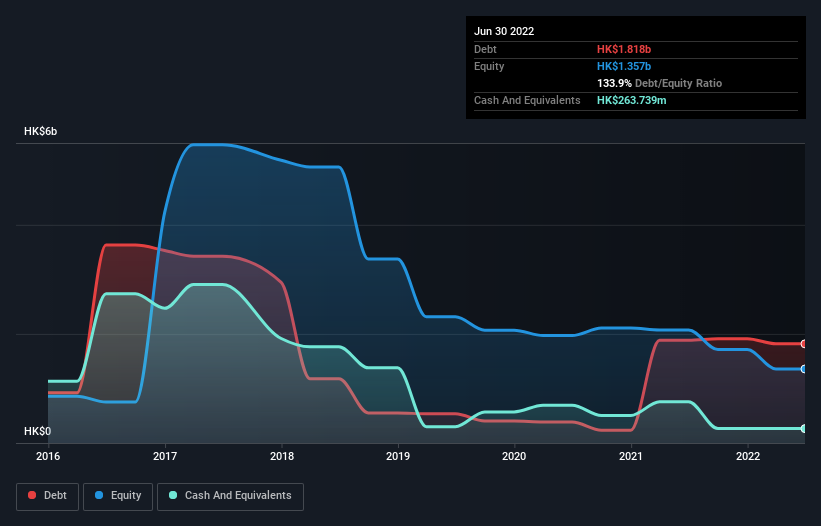
The external fund manager backed by Berkshire Hathaway's Charlie Munger, Li Lu, makes no bones about it when he says 'The biggest investment risk is not the volatility of prices, but whether you will suffer a permanent loss of capital.' So it might be obvious that you need to consider debt, when you think about how risky any given stock is, because too much debt can sink a company. As with many other companies Tai United Holdings Limited (HKG:718) makes use of debt. But the real question is whether this debt is making the company risky.
When Is Debt A Problem?
Debt is a tool to help businesses grow, but if a business is incapable of paying off its lenders, then it exists at their mercy. If things get really bad, the lenders can take control of the business. However, a more common (but still painful) scenario is that it has to raise new equity capital at a low price, thus permanently diluting shareholders. By replacing dilution, though, debt can be an extremely good tool for businesses that need capital to invest in growth at high rates of return. The first step when considering a company's debt levels is to consider its cash and debt together.
Check out the opportunities and risks within the HK Healthcare industry.
How Much Debt Does Tai United Holdings Carry?
The chart below, which you can click on for greater detail, shows that Tai United Holdings had HK$1.82b in debt in June 2022; about the same as the year before. However, because it has a cash reserve of HK$263.7m, its net debt is less, at about HK$1.55b.

How Strong Is Tai United Holdings' Balance Sheet?
Zooming in on the latest balance sheet data, we can see that Tai United Holdings had liabilities of HK$2.34b due within 12 months and liabilities of HK$505.0m due beyond that. Offsetting these obligations, it had cash of HK$263.7m as well as receivables valued at HK$74.5m due within 12 months. So its liabilities outweigh the sum of its cash and (near-term) receivables by HK$2.51b.
This deficit casts a shadow over the HK$404.3m company, like a colossus towering over mere mortals. So we'd watch its balance sheet closely, without a doubt. After all, Tai United Holdings would likely require a major re-capitalisation if it had to pay its creditors today. When analysing debt levels, the balance sheet is the obvious place to start. But you can't view debt in total isolation; since Tai United Holdings will need earnings to service that debt. So when considering debt, it's definitely worth looking at the earnings trend. Click here for an interactive snapshot.
Over 12 months, Tai United Holdings reported revenue of HK$411m, which is a gain of 290%, although it did not report any earnings before interest and tax. That's virtually the hole-in-one of revenue growth!
Caveat Emptor
Even though Tai United Holdings managed to grow its top line quite deftly, the cold hard truth is that it is losing money on the EBIT line. Its EBIT loss was a whopping HK$42m. When you combine this with the very significant balance sheet liabilities mentioned above, we are so wary of it that we are basically at a loss for the right words. Sure, the company might have a nice story about how they are going on to a brighter future. But the reality is that it is low on liquid assets relative to liabilities, and it lost HK$656m in the last year. So we think buying this stock is risky. There's no doubt that we learn most about debt from the balance sheet. However, not all investment risk resides within the balance sheet - far from it. For instance, we've identified 3 warning signs for Tai United Holdings (2 shouldn't be ignored) you should be aware of.
At the end of the day, it's often better to focus on companies that are free from net debt. You can access our special list of such companies (all with a track record of profit growth). It's free.
If you're looking to trade Tai United Holdings, open an account with the lowest-cost platform trusted by professionals, Interactive Brokers.
With clients in over 200 countries and territories, and access to 160 markets, IBKR lets you trade stocks, options, futures, forex, bonds and funds from a single integrated account.
Enjoy no hidden fees, no account minimums, and FX conversion rates as low as 0.03%, far better than what most brokers offer.
Sponsored ContentValuation is complex, but we're here to simplify it.
Discover if Tai United Holdings might be undervalued or overvalued with our detailed analysis, featuring fair value estimates, potential risks, dividends, insider trades, and its financial condition.
Access Free AnalysisHave feedback on this article? Concerned about the content? Get in touch with us directly. Alternatively, email editorial-team (at) simplywallst.com.
This article by Simply Wall St is general in nature. We provide commentary based on historical data and analyst forecasts only using an unbiased methodology and our articles are not intended to be financial advice. It does not constitute a recommendation to buy or sell any stock, and does not take account of your objectives, or your financial situation. We aim to bring you long-term focused analysis driven by fundamental data. Note that our analysis may not factor in the latest price-sensitive company announcements or qualitative material. Simply Wall St has no position in any stocks mentioned.
About SEHK:718
Tai United Holdings
An investment holding company, primarily invests in properties in the People’s Republic of China, Singapore, the United States, the United Kingdom, the Republic of Mongolia, Australia, and Belgium.
Low with imperfect balance sheet.
Market Insights
Community Narratives




